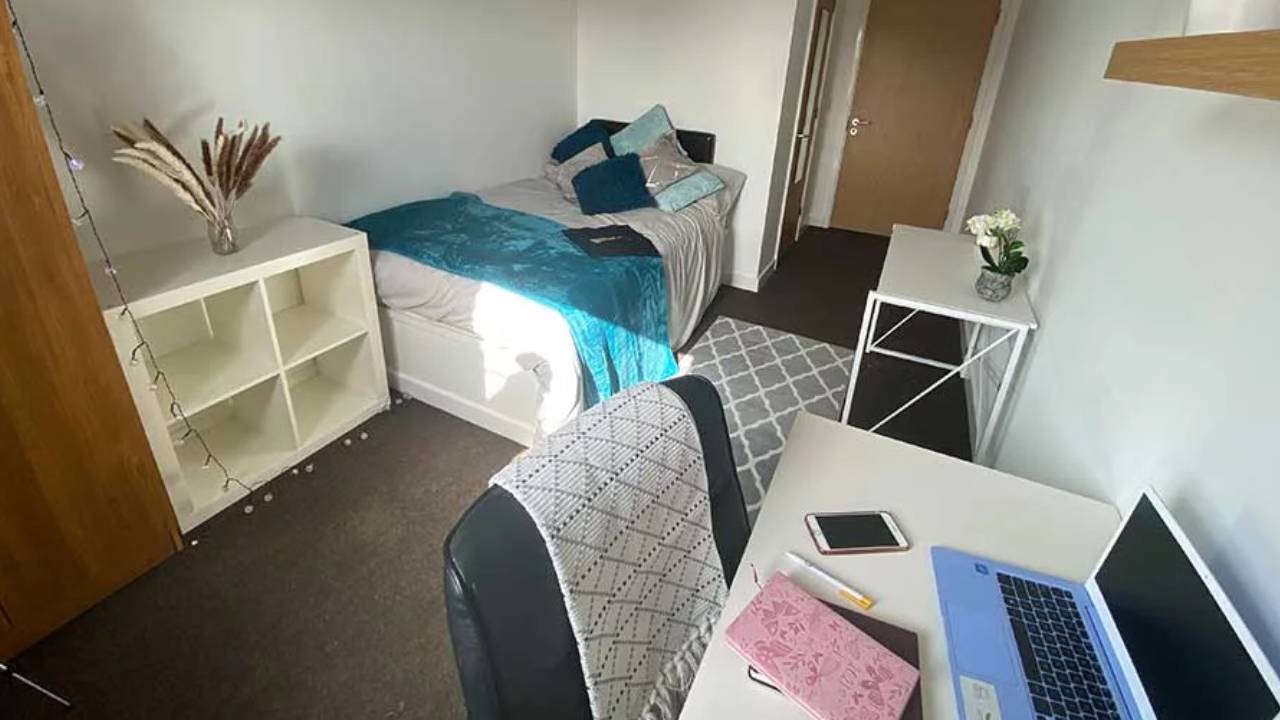Maximizing Your Study Space: Tips for Leicester Students in 2024


| Article writen by: Abby | 28 March 2024 |
In Leicester, where vibrant city life meets rich academic tradition, students find themselves navigating the unique challenge of creating effective study spaces within their rooms. Whether you're renting a cozy bedroom in a shared house, opting for a private flat or staying in shared accommodation, the key to academic success often lies in how well you can maximize your study environment. With Leicester's diverse range of rooms for rent, from traditional Leicestershire houses to modern DMU accommodations, students have ample choices but also face the task of optimizing their space for study, relaxation, and everything in between.
Understanding the Importance of a Well-Organized Study Space
Before diving into the tips, it's crucial to understand why a well-organized study space is a game-changer. In a bustling city like Leicester, where student housing varies from shared accommodations to individual flats, having a dedicated area for study can significantly enhance focus, productivity, and ultimately, academic performance. Whether it's a desk in your room or a spot in a shared area, the right environment can make all the difference.
Choosing the Right Rooms for rent
When considering rooms for rent in Leicester, prioritize spaces that can accommodate a dedicated study area. While rent per week is an important factor, especially for students looking for cheap accommodation in Leicester, the potential for creating a productive study environment should also be a key consideration. DMU accommodation and other student flats in Leicester often offer versatile spaces that can be customized to suit your study needs.

Organizing Your Study Space
- Clutter-Free Desk: Keep your desk or study area clutter-free. A tidy space promotes a focused mind. Use organizers or shelves to keep your study materials and stationery within reach but not in the way.
- Adequate Lighting: Ensure your study space has plenty of light, preferably natural light. If that's not possible, invest in good quality desk lamps to reduce eye strain.
- Ergonomic Furniture: Comfort is crucial for prolonged study sessions. Choose chairs and desks that support good posture to avoid backaches and fatigue.
Personalizing Your Study Area
While functionality is key, adding personal touches to your study space can boost motivation and make long hours of studying more enjoyable. Here are some ideas to personalize your study area:
- Inspirational Decor: Add items that inspire you, like motivational quotes, artwork, or photos of loved ones.
- Plants: Incorporate greenery to enhance the ambiance. Plants not only beautify the space but also improve air quality.
- Personal Items: Have a few personal items that make the space feel like yours. It could be a favorite mug, a keepsake, or anything that brings you joy.

Utilizing Shared Spaces
In shared accommodation in Leicester, where private space might be limited, making the most of shared areas is essential. Here are some tips for studying effectively in shared spaces:
- Communication: Establish study hours or quiet times with housemates to ensure everyone's needs are respected.
- Headphones: Invest in a good pair of noise-canceling headphones to minimize distractions.
- Portable Study Kit: Create a portable study kit with essentials like notebooks, pens, and headphones, so you can easily move to different areas without disrupting your workflow.
Balancing Aesthetics and Functionality
Your study space should be a blend of aesthetics and functionality. Aesthetically pleasing spaces can uplift your mood and enhance creativity, while functional aspects ensure productivity and comfort. Strike a balance by choosing decorations that inspire you but don't clutter the space, and furniture that is both stylish and ergonomic.
Regular Revamps
Occasionally revamping your study space can reignite your motivation. A change of scenery, even if it's just reorganizing your desk, can provide a fresh perspective and renewed energy for your studies.
Embracing Leicester's Resources
Don't forget to utilize the resources Leicester offers. Libraries, cafes, and study hubs provide alternative environments that can stimulate productivity and offer a change of pace from your usual study setting.
Our final thoughts
Maximizing your study space in Leicester, whether in a house share, a student flat, or DMU accommodation, is about more than just aesthetics. It's about creating an environment that fosters focus, inspires creativity, and supports your academic journey. By thoughtfully organizing and personalizing your study space, you set the stage for success, not just in your academic endeavors but in cultivating a lifestyle that balances work and well-being in the heart of one of the UK's most student-friendly cities.
Frequently Asked Questions
Maximizing your study space involves optimizing the use of the area to enhance productivity and comfort:
-
Use Vertical Space: Install shelves or use tall bookcases to store books, supplies, and equipment, freeing up desk space.
-
Multi-functional Furniture: Consider furniture that can serve multiple purposes, like a desk with built-in storage or a bulletin board to pin notes and reminders.
-
Declutter Regularly: Keep only essential items in your study space to reduce distractions. Regularly clean and organize your area to maintain a conducive studying environment.
-
Optimize Layout: Arrange your furniture and tools in a way that allows easy movement and access to everything you need. Ensure your chair and desk promote a good posture.
-
Use Organizational Tools: Utilize drawer organizers, desk caddies, and digital tools to keep your study materials and digital files well-organized.
-
Adapt to Your Needs: Regularly assess and adapt your study space to fit your changing needs and study habits, ensuring it remains an effective and comfortable environment for learning.
Study space is crucial for students as it directly influences their ability to focus, learn, and retain information. A designated study area helps separate academic activities from leisure or relaxation areas, which is essential for maintaining a healthy work-life balance. It provides a psychological cue that it's time to focus, which can enhance productivity and reduce procrastination. Additionally, a well-organized study space can reduce stress by minimizing distractions and helping students feel more in control of their learning environment. It also supports the development of organizational skills, as students learn to manage their study materials and keep their space tidy.
Creating an effective study space involves several key steps:
- Choose a Quiet Location: Select a space with minimal distractions. If you're in a noisy environment, consider noise-canceling headphones or white noise to maintain focus.
- Ensure Proper Lighting: Natural light is ideal, but if that's not available, use ample artificial lighting to prevent eye strain.
- Ergonomic Furniture: Invest in a comfortable chair and desk at the right height to prevent discomfort during long study sessions.
- Organize Your Space: Keep your study area clutter-free. Use shelves, folders, and drawers to organize your materials so you can easily find what you need.
- Personalize Your Space: Add personal touches that make the space inviting and inspiring, like plants, artwork, or motivational quotes.
- Technology and Tools: Ensure you have the necessary technology and tools within reach, like your computer, textbooks, pens, and paper.
- Control the Temperature: Make sure your study space is neither too hot nor too cold, as discomfort can distract from your focus.
A study room serves as a dedicated space where students can focus on their academic tasks without distractions, promoting deeper concentration and more effective learning. This environment helps students by providing a quiet and organized area that is specifically set aside for studying, which can enhance cognitive function and information retention. Having a study room also allows for the establishment of a study routine, reinforcing discipline and time management skills. Moreover, a well-designed study room can cater to a student's specific learning preferences, whether they require visual aids, ample desk space for spreading out materials, or a comfortable seating area for reading.
 中文
中文


